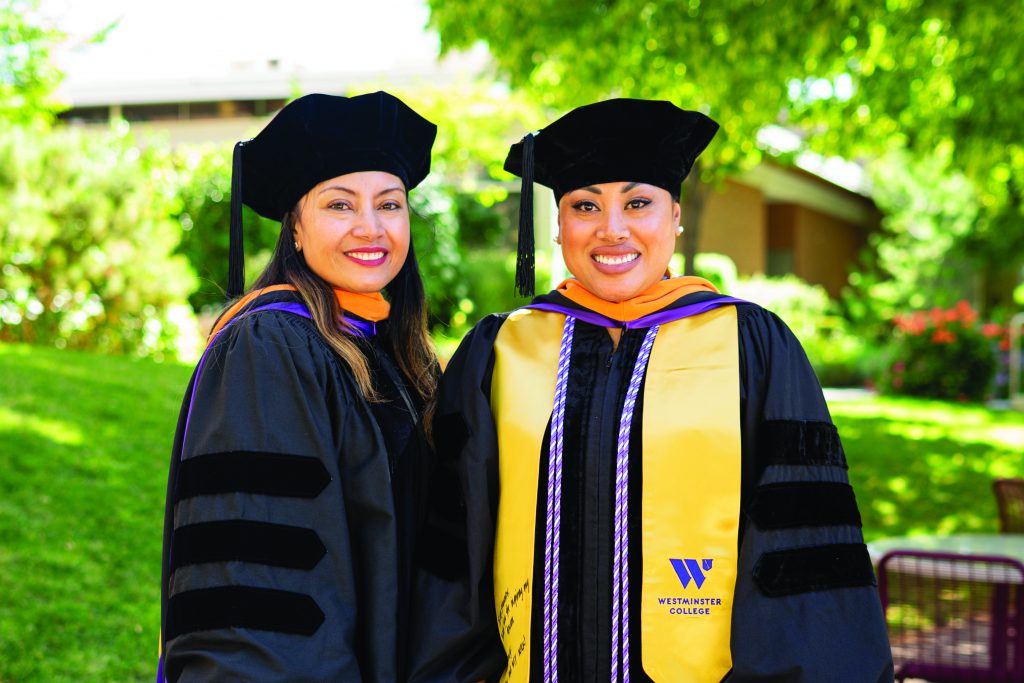
Go Farther

Two sisters earn Westminster’s first doctorate degree in honor of their father
by Johanna Droubay
Sisters Siosi Fonua (MSN ’14, DNP ’19) and Emanita Mounga (MSN ’18, DNP ’19) spent much of their childhood on an island in the mountainous Vava’u District of Tonga, where their father raised and butchered cows, chickens, and pigs. Although the sisters didn’t know then that they would both grow up to be nurses, their upbringing leant an early understanding of anatomy and physiology. “We were farmer’s kids,” Ema says. “We learned firsthand about the organs of the body.”
Their tenacious father, Tevita Siulua Tali, loved everything about animal science and agriculture. But above all he and his wife—both school teachers—prized education, and Tevita wanted his children to earn terminal degrees in whatever field they chose. “There are six of us. Five of us are girls, and my dad always believed we needed a voice,” Ema says. “That’s what the Doctor of Nursing Practice (DNP) degree is about: taking our rightful place at the table.”
In October, Siosi and Ema were among seven nurses who earned their DNP degrees in the college’s inaugural doctorate class. Westminster’s School of Nursing and Health Sciences added a DNP offering to its renowned nursing programs in 2018. A DNP is the highest degree a nurse can earn.
“I want to advocate and help mold the next generation of leaders,” Ema says. “Nurses have so much potential and so much to give. I want to lead my own team, and now I can with a doctorate.”
Siosi, who specializes in pediatric intensive care, has four school-age children; Ema specializes in cardiac nursing and has two children ages seven and 10. Both say that adding school on top of work and motherhood was challenging. But flexible attendance options like video conferencing—along with exceptionally accessible professors—made the three-semester program doable for the sisters. “I knew it was going to be a year of extreme stress,” Siosi says. “But I thought, how cool would it be if I did it with my sister? We could accomplish this together and fulfill our dad’s lifelong dream.”
Their father and his nine siblings grew up in a palm-thatched mud hut in Vava’u. “They were very, very poor,” Ema says. “He was always hungry. He wanted a better life.” At age 12, Tevita joined the Church of Jesus Christ of Latter-Day Saints, which sponsored much of his secondary and post-secondary education. He left the islands and, with the help of scholarships, earned two bachelor’s degrees: one from Brigham Young University and another from Utah State University. He was the first and only one of his siblings to graduate from high school and college.
“He got a taste of the dream life,” Ema says, referring to living on campus, attending lectures, and meeting interesting people. Education had transported him to what must have seemed like a different dimension. “He didn’t want his children to go through what he had gone through.”
The sisters say their father would have probably pursued more education himself—beyond his two bachelor’s degrees—but a series of nagging ailments turned out to be indicators of a serious condition.
“He’s an island boy,” Ema says, recalling his journey, “and then he comes to Utah, of all places. It’s winter all the time, and he gets cold.” To make ends meet during the long winters, he shoveled snow in steel-toed boots, which caused chronic ingrown toenails that never seemed to heal. Neither did an upper-respiratory infection.
Siosi and Ema were eight and nine when the family moved back to Tonga so that their father could teach at a church school and give back to the community he had left. “When he decided to move the family to Tonga, he knew he was sick, but we didn’t know how serious his sickness was,” Siosi says. “But I remember as I got older, when he would talk to me I could smell his breath. It smelled sweet.”
It would be many years before Tevita had insurance to pay for the doctor who would diagnose diabetes. Siosi says, “That’s why he had the sweet-smelling breath and toenails that would not heal: his blood sugar was so high. Things like that made sense to us later because we chose to go into this field.”
Tevita lived to see Siosi earn her master of science degree in nursing from Westminster in 2014. He passed away one month later, so he did not have the pleasure of watching his daughters receive their doctorate degrees together. But the sisters say that he always knew they could and would go far.
“He always pushed us,” Ema says. “‘That’s not the end of the road,’ he would say. ‘You have to go farther.’”
About the Westminster Review
The Westminster Review is Westminster University’s bi-annual alumni magazine that is distributed to alumni and community members. Each issue aims to keep alumni updated on campus current events and highlights the accomplishments of current students, professors, and Westminster alum.
GET THE REVIEW IN PRINT STAY IN TOUCH SUBMIT YOUR STORY IDEA READ MORE WESTMINSTER STORIES